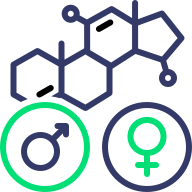Perimenopause
Perimenopause can last for months to over a decade. It is a period of transition which can bring many difficult symptoms.
Many women will report feeling fatigue, mood changes, memory problems, sleep disturbances and other difficult symptoms well before they might notice ‘typical’ menopause symptoms of hot flashes or sweats. This can lead to a misdiagnosis, especially if this begins in the early 40s.
Key Facts
- Preparing for the perimenopause and the menopause in your 40s can reduce the impact of changing hormones on your health and ease symptoms. It is important to adapt your diet to protect your heart health, bones and brain health as oestrogen and progesterone levels decline
- Weight management can become more difficult but a healthy diet in the perimenopause has been shown to reduce weight gain and improve muscle and bone health into the menopause
- Nutrient deficiencies can confound the symptoms of perimenopause, especially B vitamins, magnesium and other nutrients required for hormonal balance and resilience from stress
- Regular blood tests do not always give sufficient information about hormones. We use functional medicine tests such as the DUTCH comprehensive hormone test to personalise protocols. This can also provide useful information about whether hormone replacement therapy (HRT) may be safe or appropriate. Genetic testing can also identify additional risk factors.
- On one hand, it is important to recognise the symptoms. On the other hand, it is also important to rule out other issues and not blame everything on ‘getting older’
Best Test Options
Patient Story
History
Helen attended our clinic experiencing increased fatigue, feelings of ‘burn out’, difficulty sleeping and irritability. She was 45 years old and still had a regular period so was unsure whether this was related to the perimenopause. She had attended her GP for regular blood tests which showed normal thyroid function, no anaemia, and normal fasting blood sugars.
Tests
Helen carried out a DUTCH comprehensive hormonal analysis test. Her oestrogen levels were low normal and her progesterone was high, indicating that she was still ovulating but there was an imbalance between these hormones. She was also poorly detoxifying her oestrogen levels, possibly increasing her risk for breast cancer.
Her level of cortisol was very low through the day, showing poor resilience and recovery.
Helen also used a Continuous Glucose Monitor for two weeks. This demonstrated peaks of high blood sugar during the day that were followed by crashes, impacting her energy and stress.
Plan
Helen adapted her eating habits to support her energy and stress levels, including sources of phytoestrogens. Based on some of the triggers identified with her Continuous Glucose Monitor, Helen adapted her meals to include more protein and less carbohydrates. A tailored supplement protocol was recommended to support her energy while she adapted to a new diet and lifestyle. She commenced a herbal tincture specifically designed by our clinic with our herbalist/ pharmacist collaborator to support restful sleep, recovery and improve resilience and adrenal health.
Outcome
Within three months Helen had changed her diet in many ways, incorporating new meals and healthy snacks. She was sleeping better and had more energy and resilience to get through the day.
“I’m feeling better already! The recipes and suggestions were really helpful. I’m so glad I have a plan now and the path to good health is before me!”




